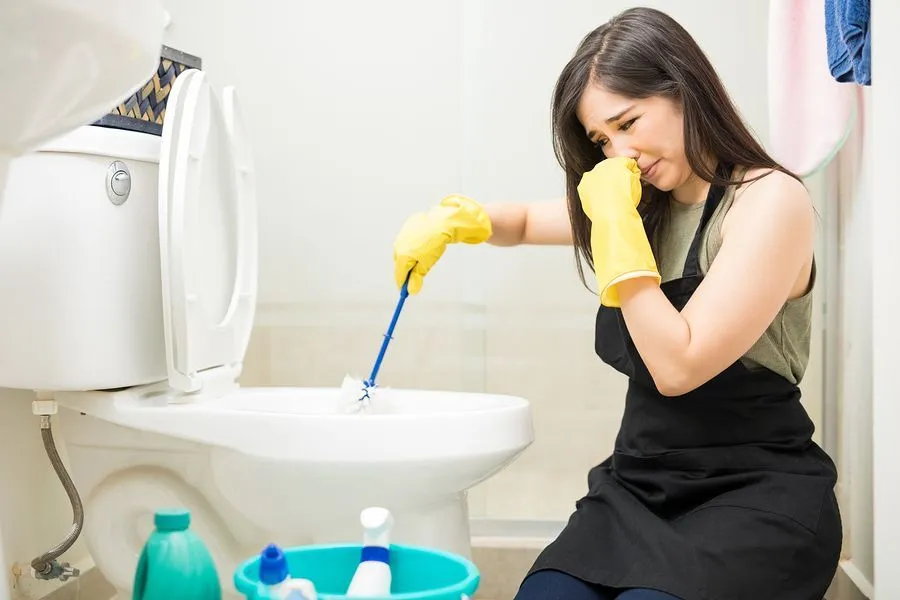Introduction:
Have you ever walked into your bathroom only to be greeted by an unpleasant odor reminiscent of sewage? This disconcerting experience can be both perplexing and frustrating. In this comprehensive exploration, we delve into the various reasons behind the notorious sewage smell in bathrooms, exploring common causes and practical solutions to ensure your bathroom remains a fresh and inviting space.
Blocked Drains and Sewer Lines:
One of the primary culprits behind a sewage-like smell in the bathroom is often blocked drains or sewer lines. Accumulation of debris, hair, soap scum, and other materials can obstruct the flow, leading to unpleasant odors.
To address this issue, regular maintenance, including drain cleaning and occasional professional inspections, is crucial.
Dry P-Trap Issues:
P-Traps, the U-shaped pipe beneath sinks and drains, are designed to retain water, preventing sewer gases from entering your home. If a P-Trap dries out, it loses its barrier function, allowing odors to permeate the bathroom.
Ensure that all P-Traps in your home have a consistent water seal, and run water in unused drains periodically to maintain the integrity of these vital components.
Ventilation Problems:
Insufficient ventilation can contribute to a foul-smelling bathroom. Proper airflow is crucial to expel odors and maintain a healthy environment. A lack of ventilation may cause stagnant air, promoting the spread of unpleasant smells.
Consider installing exhaust fans and opening windows to enhance ventilation, particularly in bathrooms without windows.
Toilet Seal Leakage:
A damaged or improperly sealed toilet can result in sewage odors. The wax ring that seals the connection between the toilet and the floor may degrade over time, leading to leaks and unpleasant smells.
Regularly inspect and replace the wax ring if necessary, ensuring a proper seal and preventing unwanted odors.
Biofilm Buildup in Pipes:
Over time, a biofilm—a thin layer of bacteria and organic matter—can develop within pipes. This buildup not only obstructs the smooth flow of water but also emits foul odors.
Regular cleaning and maintenance are essential to prevent this issue. Consider using enzyme-based drain cleaners to break down organic matter and minimize biofilm accumulation.
Sewer Gas Infiltration:
In some cases, sewer gases may infiltrate your home, causing a distinct sewage smell. This could result from damaged or deteriorating sewer pipes, requiring professional inspection and repair.
If you notice persistent odors, especially accompanied by other signs of plumbing issues, such as slow drains or gurgling noises, consult a licensed plumber to assess and address the problem.
Dried-Out Shower Drain:
Similar to the P-Trap issue, a dried-out shower drain can permit unpleasant odors to permeate the bathroom. Ensure all drains in the bathroom maintain a proper water seal by periodically running water through them.
Additionally, consider using drain covers to prevent hair and debris from accumulating in the pipes.
Bacterial Growth in Overflow Drains:
Overflow drains in sinks and tubs can harbor bacterial growth, producing unpleasant odors. Regular cleaning and disinfection of these areas can help eliminate the source of the smell.
Use a mixture of baking soda and vinegar to clean overflow drains, and follow up with boiling water to flush away any residual debris and bacteria.
FAQs:
Q1: Why does my bathroom smell like sewage after heavy rainfall?
A: Heavy rainfall can overwhelm sewer systems, leading to backups and odors. Ensure your plumbing is in good condition, and consider installing a backwater valve to prevent sewage from entering your home. Additionally, inspect your gutters and downspouts to ensure proper drainage and prevent water from seeping into your home’s foundation.
Q2: Can using chemical drain cleaners eliminate the sewage smell?
A: While chemical drain cleaners may provide a temporary solution, they can be harsh on pipes and may not address the root cause. It’s advisable to identify and fix the underlying issue for a more lasting remedy. Consider using environmentally friendly alternatives or consult a plumber for professional assistance.
Q3: How can I prevent my bathroom from smelling like sewage?
A: Regular maintenance, proper ventilation, and prompt fixing of leaks or blockages can prevent sewage smells. Keep drains clean, ensure P-Traps have water, and address plumbing issues promptly. Additionally, be mindful of what you flush down the toilet and use drain screens to prevent debris from entering the pipes.
Q4: Are there DIY solutions for eliminating bathroom odors?
A: Yes, several DIY solutions can help eliminate bathroom odors. These include pouring a mixture of baking soda and vinegar down drains, using enzymatic cleaners, and regularly cleaning and disinfecting bathroom surfaces. However, for persistent or complex issues, it’s advisable to seek professional assistance.
Q5: Can a sewage smell in the bathroom be a health concern?
A: While the smell itself may not always pose an immediate health risk, persistent sewage odors can indicate underlying plumbing issues that may lead to more significant problems if left unaddressed. Promptly addressing the source of the odor is crucial to maintaining a healthy and comfortable living environment.
Q6: How often should I schedule professional plumbing inspections?
A: Regular professional plumbing inspections, ideally once a year, can help identify and address potential issues before they escalate. However, if you notice unusual odors, slow drains, or other plumbing concerns, don’t hesitate to schedule an inspection promptly to prevent further damage.
Q7: What role does humidity play in bathroom odors?
A: High humidity levels in the bathroom can contribute to the persistence of odors by creating a favorable environment for bacterial growth. Ensure proper ventilation, use exhaust fans, and consider using moisture-absorbing products to maintain optimal humidity levels and minimize the risk of unpleasant smells.
Conclusion:
A sewage smell in your bathroom is undoubtedly unpleasant, but understanding the potential causes allows for effective resolution. Regular maintenance, prompt repairs, and proper usage can help keep your bathroom smelling fresh and inviting. If issues persist or if you’re unsure about the source of the odor, consulting a professional plumber is recommended to ensure a thorough inspection and resolution of the problem. Remember, a proactive approach to plumbing maintenance can go a long way in preserving the comfort and hygiene of your home.

A group of home improvement enthusiasts and bathroom design experts, combines in-depth knowledge and a shared passion to deliver engaging, informative content that guides readers through the world of bathroom innovation and style.

Leave a Reply